
If you approached me at a party or coffee shop and casually asked what was the overriding impression of my recent trip to Myanmar (formerly Burma), I would say without a doubt. The Pagodas.
So exotic. So prolific. So remote. So unlike my Midwestern experience.


Gold. Gold. And more Gold. Cone shaped. Decorated. Shining along the river banks. Rising over the cities. Lit up dramatically at night. Almost hidden behind trees. Truly Myanmar is a land of thousands of Pagodas. Actually I read that a half a million fill the Southeast Asian country. I believe it.







Fascinating. My first clue that they would dominate the landscape was flying into Mandalay from Bangkok. As we slowly swooped down to the runway, I looked out the window and saw the golden cones dotting the landscape. Here. There. Over there. Right below. Next to that village. In the middle of the village. Along the river. In the middle of a field.



What flashed through my mind were views of flying into midwestern towns and seeing all the red barns and patchwork fields. There seemed to be as many pagodas as we have barns. Maybe more.
I soon learned that the word pagoda in Myanmar is a term to label the religious structure, typically cone shaped and covered in gold. Some times they are white. Sometimes they are decorated and sometimes left unadorned.
A pagoda can take two forms and often both forms are sometimes found together in the same compound. A temple is a building that you can go into and a stupa is a solid structure. Stupas contain relics of the Buddha or copies of relics. Temples are gathering places, contain statues of Buddha and other alters and components of religious life. Both are referred to as Pagodas.


Some are very large and famous like the Pagodas in Yangon or Mandalay or Bagan. Typically a Temple is guarded by lions—sometimes really big ones.

Others are smaller and we saw by the hundreds along the Ayeyarwady River.
Why so many? Historically the kings supported religion in Burma and this meant building glorious pagodas. But every day people do too. Building a stupa is a way to “earn merit” the Buddhist religion, paving the way for a better life the next go round.
The statues of Buddhas in side or near the temples were captivating. Mesmerizing.
The Buddhists cover the Buddhas with gold leaf. Only men can do this and over time the Buddhas have become deformed, so much gold leaf has been applied. Women aren’t allowed to venture into the inner sanctum.



The Burmese cover the domes of the Pagodas with gold leaf as well. After learning this from our guide, my husband calculated that one of the larger Pagodas we visited would cost five million dollars to cover with gold leaf and it needed to be done every five years. Interesting to me that religion is so important that the people spend their money on gold leaf, not necessities of life.
I found seeing the people gathering at the Pagodas a fascinating look at the culture in Myanmar. They socialized. They gave alms. Families and friends gathered to attend Festivals and to meditate.
They visited temples like tourists. They cooked meals. They took pictures of each other. And they took pictures of us….yes, I was asked to pose….being such novelty in some of the places we visited. They lit candles in honor of the Buddha. They chanted.









The Pagodas are truly the center of religious and community life. Images of them will be with me forever.
For more about Myanmar, click here for a previous post.
The professional and well thought out arrangements for our travel was made through Belmond (formerly Orient Express).


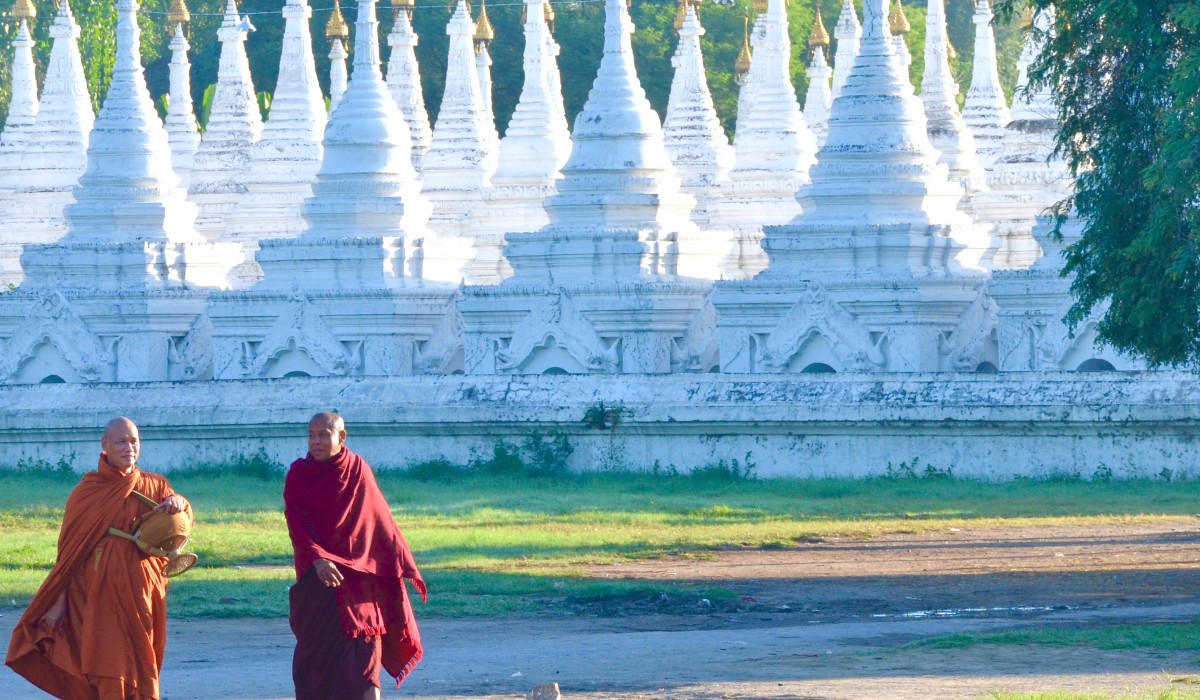














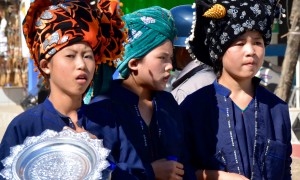
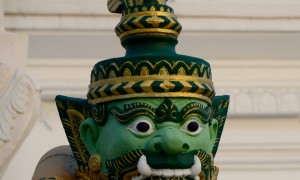
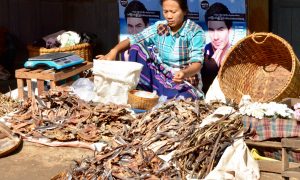
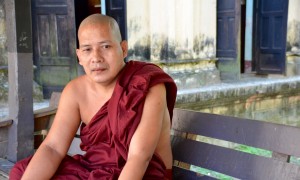
Comments
21 CommentsMargaret Scales
Feb 9, 2016Hi Susan,
Loved this entry. Which Belmond trip did you take? Looks like they have 2. And did you do any extensions?
Would love for Myanmar to be our next destination, maybe 2017 so trying to ID the vendor to use.
Any ideas appreciated.
Margaret
Susan J. Smith
Feb 9, 2016Hi Margaret, We took the Ocaela boat (their newer one) from Yangon to Bagan. Wonderful experience. Eight days with stops in remote villages. There’s a photo on the blog post before this one of the boat. And we did extra time before and after on our own organized by Belmond. Heather in their US office did a fantastic job of planning the trip for us. We especially enjoyed the time in Inle Lake which we went to because she recommended. I’ll be doing a blog post on Inle Lake some time soon.
Margaret
Feb 9, 2016Fascinating, Susan…and such lovely photos. Thanks for sharing. I definitely have to put Myanmar on my list for “some day”.
Susan J. Smith
Feb 9, 2016I’d suggest going “sooner rather than later.” Changes happening and the culture will be different as tourists descend.
Sue Schroder
Feb 9, 2016Amazing photos of an amazing place. Your lighting and composition are exquisite.
My favorites: The black and white stunner, and the closeup of the reclining Pagoda figure, counterbalanced by the reclining cell phone caller. Design Destinations does it again!
Susan J. Smith
Feb 9, 2016Thanks, Sue, I appreciate your comments. I agree. I love the guy reclining in front of the Buddha reclining. Thanks. the black and white is an adaptation of the one at the end of the blog. I really love being able to play around with the editing buttons.
peggy depersia
Feb 9, 2016Wonderful post and fabulous photos as also noted by Sue for very specific formal reasons.
As I read and viewed, I was reminded of my first experience of Romanesque and Gothic cathedrals in Western Europe, more familiar to one with a ‘Western’ heritage. What was amazing to me is that the same elements seem to prevail when it comes to ritual and worship…..the spires, the precious materials, the respectful garments, the bells, chants or other forms of what we think of as ecclesiastical music and, of course, the reverence for ‘light’. The connections that can be made seem infinite and have traveled all the way to the 21st century via all sorts of pathways including popular visual culture. Such posts as this remind me of how alike and how different things can be at the same time, even if in different places. One could go on and on.
Susan J. Smith
Feb 9, 2016Peggy, leave it to you to put the pagodas in perspective. I really appreciate your observations. Thank you.
Marie Preston
Feb 9, 2016Truly amazing…stunningly beautiful!
That is a tour unto itself!
Cultural priorities are always interesting!
Susan J. Smith
Feb 9, 2016Thank you, Marie, for your observation. I agree.
Barb Rohwer
Feb 9, 2016Simply said “stunning”!!
Susan J. Smith
Feb 9, 2016Thank you.
Pascal Gardinier
Feb 11, 2016bravo pour ce reportage magnifique . il y a toujours avec toi ce petit plus dans tes photos, un regard expert. Tu sais parfaitement saisir les situations, les êtres humains dans leur environnement
ton prochain reportage : ” perdue dans les immenses caves de champagne ” !!!
Susan J. Smith
Feb 15, 2016HI Pascal,
Jack translated this for me. Thanks so much for commenting on my blog. You are so nice. And yes, I’d love to “get lost in a huge champagne cellar.” Sounds like a terrific experience.
Susan J. Smith
Feb 15, 2016PS: stay tuned. I have lots more photos of our 16 days in Myanmar. More blog posts to come. I like to post once a week, Mondays if I can manage it.
Julie Lerner
Feb 12, 2016Hi Susan,
I just got back from the Backroads trip to Myanmar. Fabulous! I am getting the emails on my gmail account, so you can delete lernsky@aol.com.
Hope all is well,
Julie
Susan J. Smith
Feb 12, 2016Hi Julie,
How fun. I’d love to know where you traveled with Backroads. Were you mostly biking? Did you get to Inle Lake? Was it as fun as our trip to Cuba?
Thank you for your nice note.
Susan
Cindy Bera
Feb 13, 2016Absolutely amazing photos- almost hard to believe they are for real and actually exist.
Susan J. Smith
Feb 13, 2016When we’ve traveled in England, I would say, “A castle a day.” Always made me happy to visit the castles. In Myanmar you can visit Pagodas, morning, noon and night. Sooooo many and so fascinating.
Kathy
Feb 18, 2016Wow, your photography is incredible! What fun it was to learn about Pagodas through your awesome descriptions and pictures. My favorite is the precious little girl honoring the Buddha her same size!
Susan J. Smith
Feb 19, 2016Actually the Buddhists in Myanmar pay respects to the Buddhist who represents the day they were born. You see little shrines like this one for people born on a Wednesday or a Saturday. All the days of the week. Seems to have significance. She is actually pouring water on the shrine as a way of showing respect. Worshiping in a way. I’m not sure I totally understand. Your comment about that photo has me planning to do more research on the practice. Thank you.